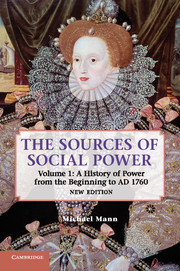Book contents
- Frontmatter
- Contents
- Preface to the new edition
- Preface
- 1 Societies as organized power networks
- 2 The end of general social evolution: how prehistoric peoples evaded power
- 3 The emergence of stratification, states, and multi-power-actor civilization in Mesopotamia
- 4 A comparative analysis of the emergence of stratification, states, and multi-power-actor civilizations
- 5 The first empires of domination: the dialectics of compulsory cooperation
- 6 “Indo-Europeans” and iron: expanding, diversified power networks
- 7 Phoenicians and Greeks: decentralized multi-power-actor civilizations
- 8 Revitalized empires of domination: Assyria and Persia
- 9 The Roman territorial empire
- 10 Ideology transcendent: the Christian ecumene
- 11 A comparative excursus into the world religions: Confucianism, Islam, and (especially) Hindu caste
- 12 The European dynamic: I. The intensive phase, a.d. 800–1155
- 13 The European dynamic: II. The rise of coordinating states, 1155–1477
- 14 The European dynamic: III. International capitalism and organic national states, 1477–1760
- 15 European conclusions: explaining European dynamism – capitalism, Christendom, and states
- 16 Patterns of world-historical development in agrarian societies
- Index
Preface
Published online by Cambridge University Press: 05 July 2013
- Frontmatter
- Contents
- Preface to the new edition
- Preface
- 1 Societies as organized power networks
- 2 The end of general social evolution: how prehistoric peoples evaded power
- 3 The emergence of stratification, states, and multi-power-actor civilization in Mesopotamia
- 4 A comparative analysis of the emergence of stratification, states, and multi-power-actor civilizations
- 5 The first empires of domination: the dialectics of compulsory cooperation
- 6 “Indo-Europeans” and iron: expanding, diversified power networks
- 7 Phoenicians and Greeks: decentralized multi-power-actor civilizations
- 8 Revitalized empires of domination: Assyria and Persia
- 9 The Roman territorial empire
- 10 Ideology transcendent: the Christian ecumene
- 11 A comparative excursus into the world religions: Confucianism, Islam, and (especially) Hindu caste
- 12 The European dynamic: I. The intensive phase, a.d. 800–1155
- 13 The European dynamic: II. The rise of coordinating states, 1155–1477
- 14 The European dynamic: III. International capitalism and organic national states, 1477–1760
- 15 European conclusions: explaining European dynamism – capitalism, Christendom, and states
- 16 Patterns of world-historical development in agrarian societies
- Index
Summary
In 1972, I wrote a paper called “Economic Determinism and Structural Change,” which purported not only to refute Karl Marx and reorganize Max Weber but also to offer the outlines of a better general theory of social stratification and social change. The paper began to develop into a short book. It would contain a general theory supported by a few case studies, including historical ones. Later I decided that the book would set forth a sweeping theory of the world history of power.
But while developing these delusions, I rediscovered the pleasure of devouring history. A ten-year immersion in that subject reinforced the practical empiricism of my background to restore a little respect for the complexity and obduracy of facts. It did not entirely sober me. For I have written this large history of power in agrarian societies, and I will follow it shortly with Volume II, A History of Power in Industrial Societies, and Volume III, A Theory of Power – even if their central thrust is now modest. But it gave me a sense of the mutual disciplining that sociology and history can exercise on each other.
Sociological theory cannot develop without knowledge of history. Most of the key questions of sociology concern processes occurring through time; social structure is inherited from particular pasts; and a large proportion of our “sample” of complex societies is only available in history. But the study of history is also impoverished without sociology.
Information
- Type
- Chapter
- Information
- The Sources of Social Power , pp. xxv - xxviiiPublisher: Cambridge University PressPrint publication year: 2012
